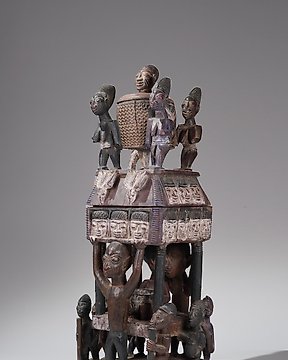
Yoruba - Nigeria (Ingen mindstepris)
Nr. 84045191

Nr. 84045191

An outstanding female Yoruba bowl keeper, Nigeria, sitting on a stool, placed on a circular base, six little figures are sitting or standing next to her, an infant is placed on her back, the main female figure is holding the large bowl with her hands and head, the large receptacle is intricacy decorated with small Yoruba figures, both female and male, also smaller bowl keepers and a ram, a larger female figure is standing on the bowl lid, the whole piece is painted with white and blue polka dots, the eyes of the main seated figure are also painted white; remnants of ritual patina, aged cracks, traces of use, signs of use. Certificate of provenance. Pick up in the Gallery only or delivery on request. Pick up in the Gallery only or delivery on request.
These sculptures were typically used by the Ekiti people to hold kola nuts, which were offered to visitors, as well as shrine containers for orisa offerings and palm nuts used in Ifa divination.in shape of a bowlkeeper, posted on a circular base, seated on her feet. Traditionally, kneeling was a gesture of respect and devotion among the Yoruba."
Lit: Rowland, Drewal & Pemberton, 1991, p. 39.
"Olowe of Ise was born about 1875 in Efon-Alaiye, a town in eastern Yorubaland that was once a kingdom and one of the most important centers of Yoruba carving. Olowe moved to Ise at a young age to serve the Arinjale (king) as a court messenger. The details of his early life and training in sculpture are not known. His descendants claim he was self-taught, but it is likely that he learned the Yoruba canon and perfected his carving skills during an apprenticeship. Eventually he became a master artist at the Arinjale's palace, and as his fame grew, other Yoruba kings and wealthy families commissioned him to carve architectural sculptures, masks, drums and other objects for their palaces.
Olowe probably carved this lidded bowl with figures for a king or other person of high social status or for a shrine. Among the Yoruba such elaborately carved and decorated bowls were prestige objects used to offer kola nuts to guests or to deities during religious worship."
Source: The Smithsonian Institute.
Sådan køber du hos Catawiki
1. Opdag noget særligt
2. Afgiv det højeste bud
3. Foretag en sikker betaling